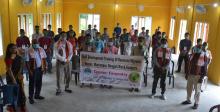Two hand-raised Asian Wild buffaloes from the IFAW-WTI run Centre for Wildlife Rehabilitation and Conservation (CWRC) were today released in Burhachapori Wildlife Sanctuary, Assam.
Agora, a male and Gerakati, a female were rescued in different circumstances in Kaziranga National Park when they were about month old age. Agora’s mother was found dead in 15th of December, 2012 while Gerakati was separated from its mother in 23rd of September, 2012. After rescue, both of them were placed at CWRC for further care and treatment.
The release site was selected after a joint survey of CWRC IFAW-WTI team and Assam Forest Department, led by P. Sivakumar, Conservator of Forest, Assam Forest Department and incharge of the Sanctuary.
“We welcome this wild buffalo rehabilitation effort of CWRC at Burachapori WLS. This will boost our continuous efforts to repopulate Burachapori WLS with important wildlife”, said P.Sivkumar, Conservator of Forest, Assam Forest Department and in-charge of the Burachapori WLS.
For the first few weeks after their release, the duo would be kept in a temporary enclosure for adaptation in the new landscape for a couple of months. As and when they adapt to their new surroundings, they will be released in the sanctuary. The IFAW-WTI team biologist along with the Assam Forest Department would continue to monitor the released animals for a stipulated time.
The CWRC is the first rescue and rehabilitation centre near a protected area in India. Strategically located in Borjuri village, adjacent to the Panbari Reserve Forest, near Kaziranga National Park in Assam, the centre attends to a wide range of wildlife emergencies resulting from natural or anthropogenic causes.
CWRC was established in August 2002 with a primary aim to stabilise displaced animals and release them back into the wild, as close to the site of rescue as possible, following necessary treatment. The centre follows accepted international protocols and guidelines during rescue, treatment and rehabilitation of displaced or distressed animals.





Add new comment